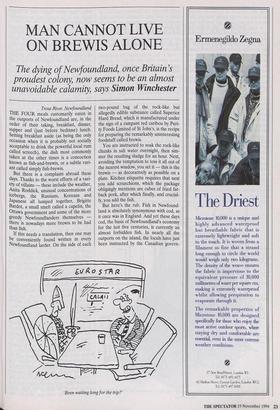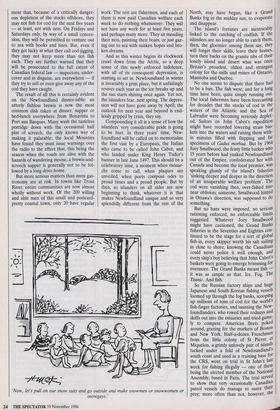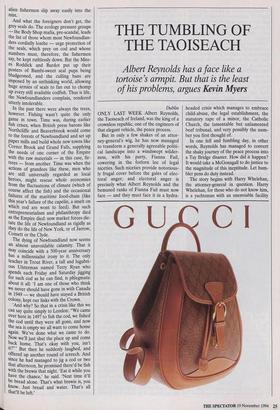MAN CANNOT LIVE ON BREWIS ALONE
The dying of Newfoundland, once Britain's proudest colony, now seems to be an almost
unavoidable calamity, says Simon Winchester Trout River, Newfoundland THE FOUR meals customarily eaten in the outports of Newfoundland are, in the order of their taking, breakfast, dinner, supper and (just before bedtime) lunch. Setting breakfast aside (as being the only occasion when it is probably not socially acceptable to drink the powerful local rum called screech), the dish most commonly taken at the other times is a concoction known as fish-and-brewis, or a subtle vari- ant called simply fish-brewis. But there is a complaint abroad these days. Thanks to the worst efforts of a vari- ety of villains — these include the weather, Anita Roddick, unusual concentrations of icebergs, the Russians, Koreans and Japanese all lumped together, Brigitte Bardot, a small smelt called a capelin, the Ottawa government and some of the more greedy Newfoundlanders themselves there is nowadays more brewis to be had than fish.
If this needs a translation, then one may be conveniently found written in every Newfoundland larder. On the side of each two-pound bag of the rock-like but allegedly edible substance called Superior Hard Bread, which is manufactured under the sign of a rampant red caribou by Puri- ty Foods Limited of St John's, is the recipe for preparing the remarkably uninteresting foodstuff called brewis.
You are instructed to soak the rock-like chunks in salt water overnight, then sim- mer the resulting sludge for an hour. Next, avoiding the temptation to toss it all out of the nearest window, you set it — this is the brewis as decoratively as possible on a plate. Kitchen etiquette requires that next you add scrunchions, which the package obligingly mentions are cubes of fried fat- back pork, after which finally, and crucial- ly, you add the fish.
But here's the rub. Fish in Newfound- land is absolutely synonymous with cod, as it once was in England. And yet these days cod, the basis of Newfoundland's economy for the last five centuries, is currently an almost forbidden fish. In nearly all the outports on the island, the locals have just been instructed by the Canadian govern- `Been waiting long for the trip?' ment that, because of a critically danger- ous depletion of the stocks offshore, they may not fish for cod for the next five years — at least, not with nets. On Fridays and Saturdays only, by way of a small conces- sion, they will be permitted to venture out to sea with hooks and lines. But, even if they get lucky at what they call cod-jigging, they may not keep more than ten fish each. They are further warned that they will be prosecuted to the full extent of Canadian federal law — inspectors, under- cover and in disguise, are everywhere — if they try to sell or even give away any of the cod they have caught.
The result of all this is certainly evident on the Newfoundland dinner-table: an utterly fishless brewis is now the most common dish taken at dinner, supper or bed-lunch everywhere from Bonavista to Port aux Basques. Many wash the tasteless porridge down with the occasional half pint of screech, the only known way of making it palatable: the local Mounties have found they must issue warnings over the radio to the effect that, this being the season when the roads are alive with the hazards of wandering moose, a brewis-and- screech supper is generally not to be fol- lowed by a long drive home.
But more serious matters than mere gas- tronomy are at risk. In towns like Trout River, entire communities are now almost wholly without work. Of the 200 willing and able men of this small and postcard- pretty coastal town, only 20 have regular work. The rest are fishermen, and each of them is now paid Canadian welfare each week to do nothing whatsoever. They will not have any work for at least five years, and perhaps many more. They sit mending their nets, painting their boats, or just gaz- ing out to sea with sunken hopes and bro- ken dreams.
And as this winter begins its clockwork crawl down from the Arctic, so a deep sense of this newly enforced indolence, with all of its consequent depression, is starting to set in. Newfoundland in winter is invariably a grim place, but it unfailingly revives each year as the ice breaks up and the sun starts shining once again. Yet not, the islanders fear, next spring. The depres- sion will not have gone away by April; the outlook for next year and beyond is end- lessly gripped by crisis, they say.
Compounding it all is a sense of how the islanders' very considerable pride is going to be hurt. In three years' time, New- foundland will be called on to memorialise the first visit by a European, the Italian who came to be called John Cabot, and who landed under King Henry Tudor's banner in late June 1497. This should be a celebratory time, a moment when monar- chs come to call, when plaques are unveiled, when poets compose odes to proud times and a proud people. But by then, so islanders on all sides are now beginning to think, whatever it is that makes Newfoundland unique and so very splendidly different from the rest of the Wow, let's pull on our snow suits and go outside and make snowmen or snowwomen or snowgays.' North, may have begun, like a Grand Banks fog in the midday sun, to evaporate and disappear. The island's fortunes are inextricably linked to the catching of codfish. If the islanders are no longer able to catch them, then, the gloomier among them say, they will forget their skills, leave their homes, turn their backs on the granite ribs of their lonely island and desert what was once Britain's proudest, oldest and strangest colony for the mills and mines of Ontario, Manitoba and Quebec.
No one seems to dispute that there had to be a ban. The fish were, and for a long time have been, quite simply running out. The local fishermen have been forecasting for decades that the stocks of cod in the waters of the Atlantic and the Sea of Labrador were becoming seriously deplet- ed. Sailors on John Cabot's expedition might have recorded lowering straw bas- kets into the waters and raising them with- in minutes filled with flapping and fat specimens of Gadus morhua. But by 1964 Joey Smallwood, the feisty little barker who 15 years before had yanked Newfoundland out of the Empire, confederated her with Canada and become the local premier, was speaking glumly of the island's fisheries `sinking deeper and deeper in the direction of an insuperable welfare problem'. The cod were vanishing then, over-fished into near oblivion; someone, Smallwood hinted in Ottawa's direction, was supposed to do something. But no bans were imposed, no serious rationing enforced, no enforceable limits suggested. Whatever Joey Smallwood might have cautioned, the Grand Banks fisheries in the Seventies and Eighties con- tinued to be the stage for a sort of global fish-in, every skipper worth his salt sailing in close to shore, knowing the Canadians could never police it well enough, and every ship's boy believing that John Cabot's baskets were going to emerge brimming for evermore. The Grand Banks meant fish it was as simple as that. Ice. Fog. The Titanic. And fish.
So the Russian factory ships and huge Japanese and South Korean fishing vessels loomed up through the fog banks, scooping up millions of tons of cod for the world s fish-finger factories, and taunting the New- foundlanders, who rowed their rodneys and skiffs out into the estuaries and tried game- ly to compete. American fleets poked around, grazing for the markets of Boston and New York. Half-a-dozen Frenchmen from the little colony of St Pierre et Miquelon, a grimly unlovely pair of islands tucked under a fold of Newfoundland's south coast and used as a training base for the CRS, went on trial in St John's last week for fishing illegally — one of them being the elected member of the National Assembly, based in Paris. The trial served to show that very occasionally Canadian. patrol vessels do manage to snare their prey; more often than not, however, the
alien fishermen slip away easily into the mist.
And what the foreigners don't get, the grey seals do. The ecology pressure groups — the Body Shop mafia, pre-scandal, leads the list of those whom most Newfoundlan- ders cordially loathe — urge protection of the seals, which prey on cod and whose numbers must, therefore, the fishermen say, be kept ruthlessly down. But the Miss- es Roddick and Bardot put up their posters of Bambi-sweet seal pups being bludgeoned, and the culling bans are imposed by an unthinking world, allowing huge armies of seals to fan out to chomp up every still available codfish. Thus is life, the Newfoundlanders complain, rendered utterly intolerable.
In the past there were always the trees, however. Fishing wasn't quite the only game in town. Time was, during earlier fish crises, when British press barons like Northcliffe and Beaverbrook would come to the forests of Newfoundland and set up paper mills and build whole new towns like Corner Brook and Grand Falls, supplying the needs of one corner of the Empire with the raw materials — in this case, fir- trees — from another. Time was when the actions of grandees like these, men who are still universally regarded as local heroes, might rescue whole economies from the fluctuations of climate (which of course affect the fish) and the occasional failures of the maritime food-chain (like this year's failure of the capelin, a smelt on which cod are wont to feed). But such entrepreneurialism and philanthropy died as the Empire died: now market forces dic- tate the life of Newfoundland as rigidly as they do the life of New York, or of Jarrow, Consett or the Clyde.
The dying of Newfoundland now seems an almost unavoidable calamity. That it may coincide with a 500-year anniversary has a millennialist irony to it. The only teacher in Trout River, a tall and lugubri- ous Ulsterman named Terry Ryan who spends each Friday and Saturday jigging for such cod as he can find, is phlegmatic about it all: 'I am one of those who think we never should have gone in with Canada in 1949 — we should have stayed a British colony, kept our links with the Crown.
'And why? So that in a crisis like this we can say quite simply to London: "We came over here in 1497 to fish the cod, we fished the cod until they were all gone, and now the sea is empty we all want to come home again. We've done what we came to do. Now we'll just shut the place up and come back home. That's okay with you, isn't ir?" But then he suddenly laughed, and offered up another round of screech. And since he had managed to jig a cod or two that afternoon, he promised there'd be fish with the brewis that night. 'Eat it while you have the chance,' he said. 'Next time it'll be bread alone. That's what brewis is, you know. Just bread and water. That's all that'll be left.'




















































































 Previous page
Previous page